Related Research Articles

Michael Lee Aday, better known by his stage name Meat Loaf, was an American singer and actor. He was known for his powerful, wide-ranging voice and theatrical live shows. His Bat Out of Hell album trilogy—Bat Out of Hell (1977), Bat Out of Hell II: Back into Hell (1993), and Bat Out of Hell III: The Monster Is Loose (2006)—has sold more than 100 million records worldwide, making him one of the best-selling music artists of all time. The first album stayed on the charts for over nine years and is one of the best-selling albums in history, still selling an estimated 200,000 copies annually as of 2016.

The Righteous Brothers are an American musical duo originally formed by Bill Medley and Bobby Hatfield but now comprising Medley and Bucky Heard. Medley formed the group with Hatfield in 1963. They had first performed together in 1962 in the Los Angeles area as part of a five-member group called the Paramours, and adopted the name The Righteous Brothers when they became a duo. Their most active recording period was in the 1960s and '70s, and, after several years inactive as a duo, Hatfield and Medley reunited in 1981 and continued to perform until Hatfield's death in 2003. The term "blue-eyed soul" is thought to have first been coined by Philadelphia radio DJ Georgie Woods in 1964 when describing the duo's music.

A rock opera is a collection of rock music songs with lyrics that relate to a common story. Rock operas are typically released as concept albums and are not scripted for acting, which distinguishes them from operas, although several have been adapted as rock musicals. The use of various character roles within the song lyrics is a common storytelling device. The success of the rock opera genre has inspired similar works in other musical styles, such as rap opera.

James Richard Steinman was an American composer, lyricist and record producer. He also worked as an arranger, pianist, and singer. His work included songs in the adult contemporary, rock, dance, pop, musical theater, and film score genres. He wrote songs for Bonnie Tyler and Meat Loaf, including Bat Out of Hell, and also wrote and produced Bat Out of Hell II: Back into Hell and Tyler's Faster Than the Speed of Night.

Bat Out of Hell is the debut studio album by American rock singer Meat Loaf and composer Jim Steinman. The album was developed from the musical Neverland. Neverland is a futuristic rock version of Peter Pan which Steinman wrote for a workshop in 1974. It was recorded during 1975–1976 at various studios, including Bearsville Studios in Woodstock, New York. The album was produced by Todd Rundgren, and released in October 1977 by Cleveland International/Epic Records. Bat Out of Hell spawned two Meat Loaf sequel albums: Bat Out of Hell II: Back into Hell (1993) and Bat Out of Hell III: The Monster Is Loose (2006).

The Wall of Sound is a music production formula developed by American record producer Phil Spector at Gold Star Studios, in the 1960s, with assistance from engineer Larry Levine and the conglomerate of session musicians later known as "the Wrecking Crew". The intention was to exploit the possibilities of studio recording to create an unusually dense orchestral aesthetic that came across well through radios and jukeboxes of the era. Spector explained in 1964: "I was looking for a sound, a sound so strong that if the material was not the greatest, the sound would carry the record. It was a case of augmenting, augmenting. It all fit together like a jigsaw."
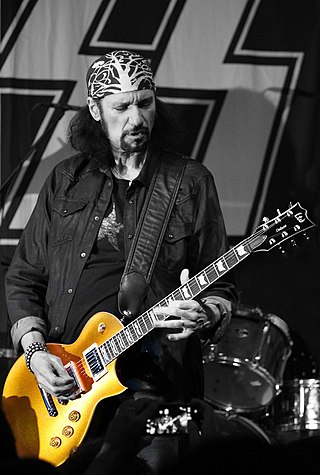
Bruce Howard Kulick is an American guitarist best known as a former guitarist of the band Kiss (1984–1996). He was also a member of Union with John Corabi from 1997–2002, Blackjack from 1979–1980 and Grand Funk Railroad from 2000–2023.
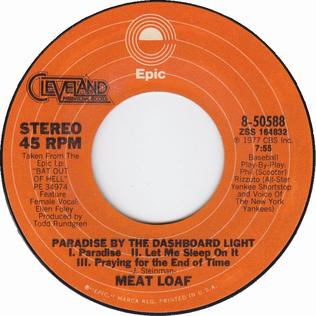
"Paradise by the Dashboard Light" is a song written by Jim Steinman. It was released in 1977 on the album Bat Out of Hell, with vocals by American musicians Meat Loaf and Ellen Foley. An uncommonly long song for a single, it has become a staple of classic rock radio and has been described as the "greatest rock duet".
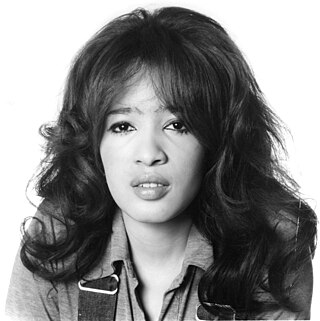
Veronica Yvette Greenfield was an American singer who co-founded and fronted the girl group the Ronettes. She is sometimes referred to as the original "bad girl of rock and roll".
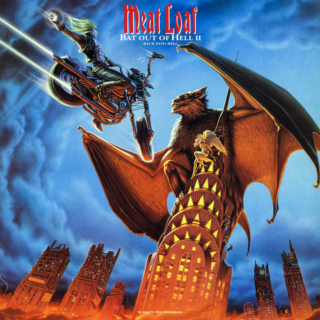
Bat Out of Hell II: Back into Hell is the sixth studio album by American rock singer Meat Loaf and the second one in the Bat Out of Hell trilogy, which was written and produced by Jim Steinman. It was released on September 14, 1993, sixteen years after Meat Loaf's first solo album Bat Out of Hell. The album reached number 1 in the United States, United Kingdom and Canada. Five tracks were released as singles, including "I'd Do Anything for Love ", which reached number 1 in 28 countries.

"I'd Do Anything for Love (But I Won't Do That)" is a song written by Jim Steinman, and recorded by American rock singer Meat Loaf featuring Lorraine Crosby. The song was released in August 1993 by MCA and Virgin as the first single from the singer's sixth album, Bat Out of Hell II: Back into Hell (1993). The last six verses feature Crosby, who was credited only as "Mrs. Loud" in the album notes. She does not appear in the accompanying music video, directed by Michael Bay, in which her vocals are lip-synched by Dana Patrick. Meat Loaf promoted the single with American singer Patti Russo.

"River Deep – Mountain High" is a song by Ike & Tina Turner released on Philles Records as the title track to their 1966 studio album. Produced by Phil Spector and written by Spector, Jeff Barry and Ellie Greenwich. Rolling Stone ranked "River Deep – Mountain High" No. 33 on their list of the 500 Greatest Songs of All Time. NME ranked it No. 37 on their list of the 500 Greatest Songs of All Time. The Rock and Roll Hall of Fame added it to the list of the 500 Songs That Shaped Rock and Roll. The song was inducted into the Grammy Hall of Fame in 1999.
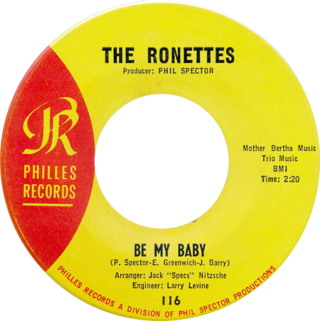
"Be My Baby" is a song by the American girl group the Ronettes that was released as a single on Philles Records in August 1963. Written by Jeff Barry, Ellie Greenwich, and Phil Spector, the song was the Ronettes' biggest hit, reaching number 2 in the U.S. and Canada, and number 4 in the UK. It was kept out of number 1 in Canada by Sugar Shack's 6 week run at number 1. It is often ranked as among the best songs of the 1960s, and has been regarded by various publications as one of the greatest songs of all time.
"It's All Coming Back to Me Now" is a power ballad written by Jim Steinman. According to Steinman, the song was inspired by Wuthering Heights, and was an attempt to write "the most passionate, romantic song" he could ever create. The Sunday Times posits that "Steinman protects his songs as if they were his children". Meat Loaf, who had collaborated with Steinman on most of his hit songs, had wanted to record the song for years, but Steinman refused, saying he saw it as a "woman's song". Steinman won a court case, which prevented Meat Loaf from recording it. Girl group Pandora's Box went on to record it, and it was subsequently made famous through a cover by Celine Dion, which upset Meat Loaf because he was going to use it for a planned album with the working title Bat Out of Hell III.

"Bat Out of Hell" is a song written by Jim Steinman for the 1977 album Bat Out of Hell and performed by Meat Loaf. In Australia, the song was picked as the second single from the album in May 1978, accompanied by a music video. In January 1979, the song was released as a single in the UK and other European countries, and re-released in 1993.
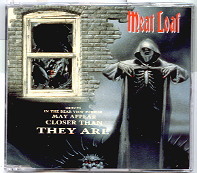
"Objects in the Rear View Mirror May Appear Closer Than They Are" is a song composed and written by Jim Steinman, and recorded by Meat Loaf. The song was released in 1994 as the third single from the album Bat Out of Hell II: Back into Hell and it reached number 38 on US's Billboard Hot 100, and number 26 in the UK Top 40. With its chart success, this song became the hit with the longest un-bracketed title at fifty-two characters as of 2007. The title is derived from the safety warning on car side mirrors in the US, "Objects in mirror are closer than they appear".
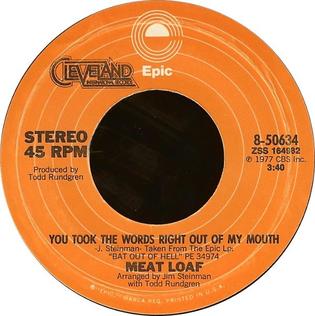
"You Took the Words Right Out of My Mouth" (also known as "You Took the Words Right Out of My Mouth (Hot Summer Night)") is the first solo single by the American singer Meat Loaf, released in 1977. It is a track from his album Bat Out of Hell, written by Jim Steinman.
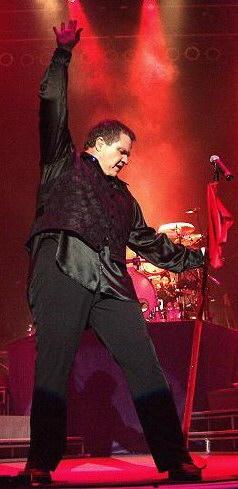
American singer and actor Meat Loaf (1947–2022) released twelve studio albums, five live albums, seven compilation albums, one extended play and thirty-nine singles. In a career that spanned six decades, he sold over 100 million records worldwide. According to Recording Industry Association of America, he sold 25 million certified records in the US alone.
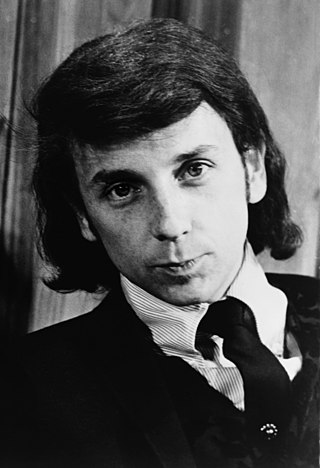
Harvey Phillip Spector was an American record producer, songwriter, and convicted murderer. He is best known for his innovative recording practices and entrepreneurship in the 1960s along with his two trials and conviction for the murder of Lana Clarkson in the 2000s. Spector developed the Wall of Sound, a production style that is characterized for its diffusion of tone colors and dense orchestral sound, which he described as a "Wagnerian" approach to rock and roll. He is widely regarded as one of the most influential figures in pop music history and one of the most successful producers of the 1960s.

Braver Than We Are is the twelfth and final studio album by American singer Meat Loaf, released in Europe on September 9, 2016, by Caroline International S&D and released in the United States on September 16, 2016 by 429 Records.
References
- ↑ "Phil Spector". Biography.com. April 27, 2017. Retrieved June 8, 2021.
- ↑ Levy, Daniel (December 16, 1991). "Critics' Voices: Dec. 16, 1991". Time . Time's Reviewers. ISSN 0040-781X.
- ↑ Mossman, Kate (June 30, 2017). "Ever wondered what Meat Loaf was on about? The musical that unlocks the mystery". www.newstatesman.com.